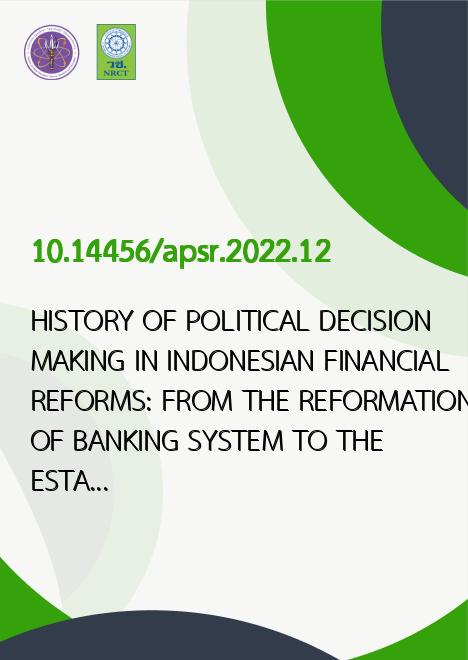
|
HISTORY OF POLITICAL DECISION MAKING IN INDONESIAN FINANCIAL REFORMS: FROM THE REFORMATION OF BANKING SYSTEM TO THE ESTABLISHMENT OF OTORITAS JASA KEUANGAN |
|---|---|
| รหัสดีโอไอ | |
| Creator | Munadi HERLAMBANG |
| Title | HISTORY OF POLITICAL DECISION MAKING IN INDONESIAN FINANCIAL REFORMS: FROM THE REFORMATION OF BANKING SYSTEM TO THE ESTABLISHMENT OF OTORITAS JASA KEUANGAN |
| Contributor | Wihana Kirana JAYA, Riza Noer ARFANI, I Wayan Nuka LANTARA |
| Publisher | Asian Political Science Review |
| Publication Year | 2565 |
| Journal Title | Asian Political Science Review |
| Journal Vol. | 6 |
| Journal No. | 2 |
| Page no. | 61-73 |
| Keyword | Political Decision, Rational Decision, Financial Reforms, Otoritas Jasa Keuangan |
| URL Website | https://so01.tci-thaijo.org/index.php/APSR |
| Website title | https://so01.tci-thaijo.org/index.php/APSR/article/view/257155 |
| ISSN | 2730-3624 |
| Abstract | Indonesian government and public believe that strong, rational, and independent financial institution would bring economic welfare and reducing the damage of horrifying global economic-financial crisis that had happened, they believe that this institutional configuration is analogous to the effort in eradicating corruption. However, financial reforms in Indonesia do not solely formulated base on economical perspective but the political decisions were/are taking a large part in formulating such reforms. Unfortunately, there is no specific definition or method to delineate the difference between economic and political decisions. This paper took the challenge to explain and distinguish the economic and political decision in the context of financial reforms in Indonesia. This paper will also contrast the types of political decisions, for instances political decisions between state actors, political actors, and institutions. The research is conducted qualitatively, engaging a wide range of sources from historical and political analyses, international covenants and agreements as well as national legislations. As the title denotes, the paper will historically scrutinize the political motif behind the decision-making procedure in Indonesian financial reform, through discovery and investigation of historical facts, also tailoring interpretations to produce explanatory narrative. This paper argues that Indonesian financial reforms does not solely rely to rational, rigid and deductive economic analyses, in contrast the decisions often based on political negotiations and deals. Therefore, challenge the legitimacy of the decisions whether it is benefiting the people. |